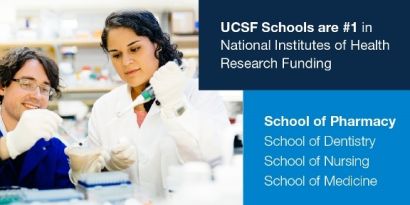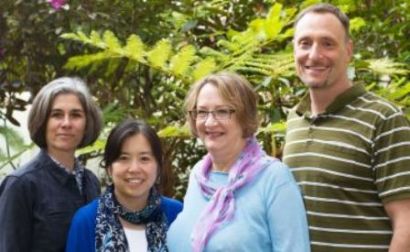- About
- Organization
- Organization Overview
- Dean’s Office
- Department of Bioengineering and Therapeutic Sciences
- Department of Clinical Pharmacy
- Department of Pharmaceutical Chemistry
- Quantitative Biosciences Institute
- Org Chart
- Research
- Education
- Patient Care
- People
- News
- Events
UCSF School of Pharmacy leads in NIH funding for 36th year in a row
By David Jacobson / Thu Mar 31, 2016

UCSF News
For the 36th consecutive year, the UCSF School of Pharmacy has received more funding from the National Institutes of Health (NIH) than any other pharmacy school in the United States.
School researchers were awarded $27 million during NIH’s 2015 fiscal year, from October 1, 2014 to September 30, 2015. Rankings of schools are compiled by the independent Blue Ridge Institute for Medical Research based on the most current NIH data.
Top new grants
School faculty members receiving the five largest new NIH research grants during fiscal year 2015 were:
- Deanna Kroetz, PhD8, Department of Bioengineering and Therapeutic Sciences, $851,184: Part of a five-year, $3.8 million study to identify genetic predictors of patients at increased risk of toxic side effects from taxanes9, a class of drugs widely used to treat a variety of cancers. The project may also provide the basis for targeted therapies to prevent or treat those adverse effects.
- Kathy Giacomini, PhD10, Department of Bioengineering and Therapeutic Sciences, $837,363: Part of a four-year, $3 million study to identify the genetic variations underlying ethnic and individual differences in the effectiveness of metformin11, the most widely used first-line medication for treating type 2 diabetes. This project will also engineer those gene variants into cells to further analyze how they cause altered drug response.
- Xiaokun Shu, PhD12, Department of Pharmaceutical Chemistry, $313,038: Part of a four-year, $1.25 million project to develop genetically encoded infrared fluorescent reporters that will allow scientists to view the activity of protease enzymes in living animals. Protease enzymes cleave other proteins and are involved in almost every biological process underlying health and disease. The project’s reporters will be used to track and analyze programmed cell destruction in embryo development and brain tumor growth.
- Steven Altschuler, PhD13, Department of Pharmaceutical Chemistry, $312,626: Part of a four-year, $1.25 million project to decipher the role of a key kinase enzyme (GSK-3) in helping to organize and stabilize the lining of the intestine in response to upstream signals, a process that goes awry in bowel diseases and gastrointestinal cancers. The project, using innovative lab models mimicking gut epithelial tissue as well as live-cell reporters of GSK-3 activity, will also identify drug classes whose effects are GSK-3 dependent.
- Tanja Kortemme, PhD14, Department of Bioengineering and Therapeutic Sciences, $300,906: Part of a four-year, $1.2 million project to pioneer the computational design of sensors made out of biological components to detect and respond to molecular signals inside living cells, providing new ways to probe and understand processes underlying health and disease. Specifically, the effort will engineer two-protein complexes so they preferentially assemble in the presence of a particular small molecule. The combining proteins, in turn, will be linked to split reporter molecules that glow when brought together (yielding detection) or activate another biological response, such as catalysis of a chemical reaction.
Top ongoing grants
In addition to the major newly funded projects, the following five ongoing projects at the UCSF School of Pharmacy received the most NIH funding during fiscal year 2015:

UCSF
Women's Interagency HIV Study Leadership (left to right): Project Director Jennifer Cohen, MPA; with Principal Investigators Phyllis Tien, MD, MS; Ruth Greenblatt, MD; and Bradley Aouizerat, PhD.
- The Connie Wofsy Women’s HIV Study. $3.2 million. Principal Investigator: Ruth Greenblatt, MD15, Department of Clinical Pharmacy. The San Francisco Bay Area arm of the largest and longest-duration study of HIV infection in women in the United States. The project seeks to understand why HIV medicines do not eliminate the problems of poor health among women living with HIV infection.
- Building an Implantable Artificial Kidney16. $1.3 million. Principal Investigator: Shuvo Roy, PhD17, Department of Bioengineering and Therapeutic Sciences. Project entails a national effort to create a long-term treatment for end-stage renal disease—which affects more than 600,000 Americans and costs the health care system more than $40 billion a year. The goal is a surgically implantable device that will carry out the vital functions of a healthy kidney, from filtering waste to regulating blood pressure.
- Resource for Biocomputing, Visualization, and Informatics18. $1.3 million. Principal Investigator: Thomas Ferrin PhD, Department of Pharmaceutical Chemistry. The RBVI develops and distributes software and web-based tools used worldwide for visualizing and analyzing molecular structures—from atomic-level details to large interacting complexes. The resource also creates computational tools to visually map data on the myriad molecular interactions in biological systems that underlie health and can be perturbed by disease. For more about Ferrin and the RBVI, see 2015 NIH Funding: A Look at the Researchers Behind the Numbers19.
 UCSF News
UCSF NewsThomas Ferrin, PhD
- Bio-Organic Biomedical Mass Spectrometry Resource20. $887,000. Principal Investigator: Al Burlingame, PhD21, Department of Pharmaceutical Chemistry. One of five such NIH-funded facilities nationwide, the UCSF resource is a world leader in using mass spectrometry to identify and analyze the hundreds of thousands of different protein molecules that carry out the activities of life in our bodies. The facility has a particular focus on ongoing modifications to these proteins that affect their function in health, disease, and in response to drugs, toxins, and infections.
- Role of ABCG2 in the Disposition and Anti-Hyperuricemic Effects of Allopurinol22. $671,330. Principal Investigator: Kathy Giacomini, PhD10, Department of Bioengineering and Therapeutic Sciences. Gout afflicts more than eight million Americans and is the most common form of inflammatory arthritis. The study is analyzing the mechanisms responsible for the beneficial effects of the first-line gout medication allopurinol—including the role of the ABCG2 gene and the transporter protein it encodes in the drug's disposition in the body. This research will help explain why the drug is not fully effective in more than half of patients and may lead to more genetically precise, personalized treatments.
More
Series
Funding Rankings · Pharmacy24
| Wed Feb 26, 2025 | UCSF School of Pharmacy Leads in NIH Funding for 45th Consecutive Year25 |
| Mon Mar 18, 2024 | School of Pharmacy leads in NIH funding for the 44th straight year26 |
| Mon Feb 20, 2023 | UCSF School of Pharmacy leads in NIH funding for the 43rd straight year27 |
| Tue Feb 15, 2022 | UCSF School of Pharmacy leads in NIH funding for the 42nd straight year28 |
| Thu Feb 18, 2021 | UCSF School of Pharmacy leads in NIH funding for the 41st straight year29 |
Tags
Keywords:
biomarkers30, pharmacogenomics31, taxanes32, Metformin33, cancer34, side effects35, type 2 diabetes36, infrared reporters37, embryonic development38, kinase39, bowel disease40, biosensors41, signaling42, heterodimers43, precision medicine44
Category:
Sites:
School of Pharmacy, Department of Pharmaceutical Chemistry, Department of Bioengineering and Therapeutic Sciences, Department of Clinical Pharmacy, PharmD Degree Program, BMI, CCB, PSPG, Bioinformatics, Biophysics
About the School: The UCSF School of Pharmacy aims to solve the most pressing health care problems and strives to ensure that each patient receives the safest, most effective treatments. Our discoveries seed the development of novel therapies, and our researchers consistently lead the nation in NIH funding. The School’s doctor of pharmacy (PharmD) degree program, with its unique emphasis on scientific thinking, prepares students to be critical thinkers and leaders in their field.










